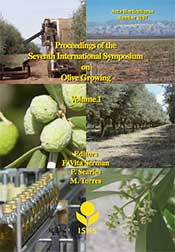Ver ítem
- xmlui.general.dspace_homeCentros Regionales y EEAsCentro Regional Mendoza - San JuanEEA San JuanArtículos científicosxmlui.ArtifactBrowser.ItemViewer.trail
- Inicio
- Centros Regionales y EEAs
- Centro Regional Mendoza - San Juan
- EEA San Juan
- Artículos científicos
- Ver ítem
Preliminary results of soil biological and chemical properties after land spreading alperujo in intensively-managed olive orchards in San Juan, Argentina
Resumen
Utilization of olive oil mill wastes as olive groves soil amendment represents a simple option to recycle the residues and restore organic matter to soils. This practice has been widely evaluated in Mediterranean countries, however, there is still little consensus about the effects that it may produce on soil quality indicators. Substantial differences on climatic, soil, irrigation and management conditions as well as in the type of olive waste applied
[ver mas...]
Utilization of olive oil mill wastes as olive groves soil amendment represents a simple option to recycle the residues and restore organic matter to soils. This practice has been widely evaluated in Mediterranean countries, however, there is still little consensus about the effects that it may produce on soil quality indicators. Substantial differences on climatic, soil, irrigation and management conditions as well as in the type of olive waste applied and the application method prevent to formulate wide-ranging conclusions and force to evaluate each single situation. The aim of this work was to evaluate under local conditions the use of alperujo (semisolid by-product of two-phase olive oil mills) as soil amendment on high-density drip-irrigated olive groves. A surface layer of alperujo was applied in soils under olive trees at doses of 40 t/ha without subsequent land incorporation and soil biological and chemical parameters were evaluated after one year of the application. The results showed that alperujo amendment increased soil nitrogen (N) and available potassium (K) without affecting the levels of available phosphorous (P), water-soluble phenolic compounds (PC), C/N ratio and soil pH. Electrical conductivity (EC) was significantly increased but presenting values insufficient to adversely affect the normal growth of most crops. Regarding to biological indicators, no differences were observed in the total number of culturable soil microorganisms neither on the activity of organic matter degrading enzymes nor on the germination index of Medicago sativa seeds. Together the results indicate that soil application of alperujo under local conditions may constitute an interesting alternative to reuse
this residue and supply essential nutrients to soil. Undoubtedly special attention must be taken on the increase on EC levels, therefore further long term assays must be performed.
[Cerrar]

Autor
Monetta, Pablo Miguel;
Ibañez, Antonio;
Fernández-Gnecco, G.;
Vega Ávila, A.D.;
Medina, E.M.;
Paroldi, H.E.;
Toro, M.E.;
Vázquez, F.;
Descripción
Trabajo presentado al VII International Symposium on Olive Growing, 2014
Fuente
Acta Horticulturae 1057: 693-700 (Oct. 2014)
Fecha
2014-10-30
Editorial
ISHS
ISSN
0567-7572
2406-6168
2406-6168
ISBN
978-94-62610-47-7
Formato
pdf
Tipo de documento
artículo
Palabras Claves
Derechos de acceso
Restringido
 Excepto donde se diga explicitamente, este item se publica bajo la siguiente descripción: Creative Commons Attribution-NonCommercial-ShareAlike 2.5 Unported (CC BY-NC-SA 2.5)
Excepto donde se diga explicitamente, este item se publica bajo la siguiente descripción: Creative Commons Attribution-NonCommercial-ShareAlike 2.5 Unported (CC BY-NC-SA 2.5)

